- Home
- John Boyne
The Terrible Thing That Happened to Barnaby Brocket Page 2
The Terrible Thing That Happened to Barnaby Brocket Read online
Page 2
“Ow,” gurgled Barnaby Brocket.
“You want to keep ahold of that lad,” remarked the taxi driver, staring at him with world-weary eyes. “He’ll get away from you if you’re not careful.”
“Thirty dollars, was it?” asked Eleanor, handing across a twenty and a ten as she realized that, yes, he might. If she wasn’t careful.
As she entered the house, the children ran to greet their mother, almost knocking her over in their excitement.
“But he’s so small,” said Henry in surprise. (In this regard at least, Barnaby was perfectly normal.)
“He smells delicious,” said Melanie, giving him a good sniff. “Like a mixture of ice cream and maple syrup. What’s his name anyway?”
“Can we call him Jim Hawkins?” asked Henry, who had taken to classic adventure stories in a big way.
“Or Peter the Goatherd?” asked Melanie, who always followed where her elder brother led.
“His name is Barnaby,” said Alistair, coming over now and placing a kiss on his wife’s cheek. “After your grandfather. And your grandfather’s grandfather.”
“Can I hold him?” asked Melanie, reaching forward, her arms outstretched.
“Not just now,” said Eleanor.
“Can I hold him?” asked Henry, whose arms reached farther than his sister’s, as he was three years older.
“No one is holding Barnaby,” snapped Eleanor. “No one except your father or me. For the time being anyway.”
“I’d rather not hold him just now, if it’s all the same to you,” said Alistair, staring at his son as if he was something that had escaped from a zoo and should be sent back there before he caused any damage to the soft furnishings.
“Well, he’s your responsibility too,” snapped Eleanor. “Don’t think I’m taking care of this … this …”
“Baby?” suggested Melanie.
“Yes, I suppose that’s as good a word as any. Don’t think I’m taking care of this baby all on my own, Alistair.”
“I’m happy to help, of course,” said Alistair, looking away. “But you are his mother.”
“And you’re his father!”
“He seems to have bonded with you, though. Look at him.”
Alistair and Eleanor looked down at Barnaby’s face and he smiled up at them, kicking his arms and legs in delight, but neither parent smiled back. Henry and Melanie looked at each other in surprise. They weren’t used to their parents speaking in such a brusque fashion. They fished out the present they’d bought the previous day by pooling their pocket money.
“It’s for Barnaby,” said Melanie, handing it across. “To welcome him into the family.” In her hands she held a small gift-wrapped box, and Eleanor felt her heart soften a little at the welcome they were showing their little brother. She reached out to take the gift, but the moment she did so, Barnaby began to float upward once again, his blanket slipping away from him and falling to the floor as he drifted toward the ceiling, which was a much farther distance to travel than the roof of the taxi cab. It was also much harder on his head.
“Ow,” grunted Barnaby Brocket, his tiny body stretched out flat as he looked down at his family, a decidedly grumpy expression on his face now.
“Oh, Alistair!” cried Eleanor, throwing up her arms in despair. Henry and Melanie said nothing; they simply stared up with their mouths wide open and expressions of wonder on their faces.
Captain W. E. Johns appeared, yawning, roused from sleep, and looked at the family that kept him fed, watered, and imprisoned before following the direction of the children’s gaze until he too saw Barnaby on the ceiling, at which point his tail began to wag fiercely and he started to bark.
“Bark!” he barked. “Bark! Bark! Bark!”
A little later—although not quite as soon as you might expect—Alistair climbed on a chair to retrieve his son, taking charge of him now, as Eleanor had retired to bed with a mug of hot milk and a headache. Reluctantly, he gave Barnaby his bottle, then changed his nappy, placing a new one under the baby’s bottom just as Barnaby decided to go again, in a perfect golden arc in the air. Finally, Alistair placed him in his basket, clipping the straps from Henry’s rucksack across the top so he couldn’t float up. At last Barnaby went to sleep and probably dreamed of something funny.
“Melanie, keep an eye on your brother,” said Alistair, positioning his daughter in the seat next to him. “Henry, come with me, please.”
Father and son crossed the garden to their neighbor’s house and knocked on the front door.
“What do you need, Brocket?” asked grumpy old Mr. Cody, picking a flake of tobacco from between his front teeth and flicking it to the ground at their feet.
“The loan of your van,” explained Alistair. “And its accompanying trailer. Just for an hour or two, that’s all. And of course I’ll compensate you for the gas.”
Permission granted, Alistair and Henry drove across the Harbour Bridge into the city and made their way to a large department store on Market Street, where they purchased three large mattresses, each of which was designed for a double bed, a box of twelve-inch nails, and a hammer. Returning home, they dragged the mattresses into the living room, where Melanie was sitting exactly where they’d left her, staring at her sleeping baby brother.
“How was he?” asked Alistair. “Any problems?”
“No,” said Melanie, shaking her head. “He’s been asleep the whole time.”
“Good. Well, take him into the kitchen, there’s a good girl. I have a job to do in here.”
He took two ladders from the garden shed and placed them at either end of the living room, then climbed one, holding the left-hand side of a mattress as he did so, while Henry climbed the other, holding the right.
“Hold it steady now,” said Alistair as he took the first long nail from his breast pocket and used the hammer to pin the corner of the mattress to the ceiling. The nail went through easily enough but met a bit of resistance in the floorboards of the upstairs room. Still, it didn’t take too long until he got it right.
“Now the other corner,” he said, moving his ladder across and nailing the next part of the mattress in place. He continued doing this for almost an hour, using twenty-four nails in total, and by the time he finished, the previously white ceiling had been covered over by the rather flowery design of a David Jones Bellissimo plush medium mattress.
“What do you think?” asked Alistair, looking down at his son for approval.
“It’s unusual,” replied Henry, considering it.
“I’ll give you that,” agreed Alistair.
By now, the sound of all that hammering had woken Barnaby and he was making a series of unintelligible gurgling sounds from his basket as Melanie tickled him under the chin and arms and generally made a nuisance of herself. Eleanor’s headache had grown worse too, and she’d come downstairs to find out what all that infernal banging was about. When she saw what her husband had done to the living-room ceiling, she stared at him, speechless, for a moment, wondering whether everyone in the house had gone quite mad.
“What on earth …?” she asked, struggling for words, but Alistair simply smiled at her and brought the basket into the center of the living room, where he unclipped the rucksack cords to allow Barnaby to float upward once again. This time, however, he didn’t bang his head against the ceiling and he didn’t say “Ow.” Instead, he had a much softer landing and seemed perfectly content to be left up there, playing with his fingers and examining his toes.
“It works,” said Alistair in delight, turning to his wife, expecting her to be pleased by what he had done, but Eleanor, a perfectly normal woman, was aghast.
“It looks ridiculous,” she cried.
“But it won’t be for long,” said Alistair. “Just until he settles down, that’s all.”
“But what if he never settles down? We can’t leave him up there forever.”
“Trust me, he’ll get tired of all this floating business in due course,” insisted Alistair, tryin
g to be optimistic, despite the fact that he felt anything but. “Just wait, you’ll see. But until then we can’t have him bumping his head every time he gets away from us. He’ll damage his brain.”
Eleanor said nothing, just looked miserable. She lay down on the sofa and stared up at her son, stranded eleven feet above her, and wondered what she had ever done to deserve such a terrible misfortune. She was a perfectly normal woman, after all. She wasn’t the type to have a floating baby.
In the meantime, Alistair and Henry went about their business, installing the second mattress in the kitchen, directly over the place where Barnaby’s basket would be kept, and the third in his and Eleanor’s bedroom, for when he was asleep in his cot beside them at night.
“All done,” said Alistair, coming downstairs and finding Eleanor still lying on the sofa while Melanie sat on the floor next to her, reading Heidi for the seventeenth time. “Where’s Barnaby?”
Melanie pointed her index finger upward but uttered not a word; her eyes were pinned to the page. Peter the Goatherd was speaking and she wanted to hear his every syllable. That boy had wisdom beyond his years.
“Oh yes,” said Alistair, frowning, wondering what he should do next. “Do you think it’s all right to leave him up there for the rest of the day?”
Melanie continued to read until she reached the end of a long paragraph, and then picked up her bookmark. She placed it carefully between pages 104 and 105 and set the novel on the cushion beside Eleanor before looking directly at her father. “You’re asking me whether she should leave Barnaby on the ceiling of our living room for the rest of the day,” she said coolly.
“Yes, that’s right,” said Alistair, unable to look his daughter in the eye.
“Barnaby,” she repeated, “who is only a few days old. You want to know whether I think it’s all right to just leave him stranded up there.”
There was a long pause.
“I don’t care for your tone,” said Alistair eventually, his voice quiet and filled with shame.
“The answer to your question is no. No, I don’t think it’s all right to leave him up there like that.”
“Well, then,” said Alistair, reaching for a chair in order to retrieve the boy. “Perhaps you could have just said so.”
At that moment the doorbell rang. It was Mr. Cody from next door looking for the keys to his van and, having received no immediate answer, marching in to retrieve them without so much as a by-your-leave. Alistair put Barnaby back in his basket but forgot to tie the straps, and in a moment the boy was on the ceiling once again, resting comfortably against the mattress.
Mr. Cody, who had lived a long time, fought in two world wars, shaken the hand of Roald Dahl, and seen many unusual things across seven decades, some of which he had understood and some of which he hadn’t, looked up and cocked his head to one side. He stroked his chin with one hand and ran his tongue slowly across his lips, first the upper lip, then the lower. Finally, shaking his head, he turned to Eleanor.
“That’s not normal, that,” he said, at which point Eleanor burst into tears and fled upstairs to throw herself on her bed, determined not to open her eyes lest she see the awful monstrosity of the third mattress pinned above her.
Chapter 3
Barnaby the Kite
When four years passed and nothing had changed, Barnaby’s family had to accept that this wasn’t a phase after all; it was just the way their son had been born. Alistair and Eleanor took him to a local doctor, who examined him thoroughly and suggested that they give him a couple of pills and call again in the morning, but this did nothing to improve matters. They took him to see an out-of-town specialist, who placed him on a course of antibiotics, but still he continued to float, although he became completely immune to a bad flu that was raging through Kirribilli that week. Finally, they drove him into the center of Sydney for an appointment with a famous consultant, who simply shook his head and said that the boy would grow out of it in time.
“Boys usually grow out of everything in the end,” he said, smiling as he passed across a rather large invoice for the rather short time he’d spent examining Barnaby. “Their trousers. Their good behavior. Their willingness to respect parental authority. You simply have to be patient, that’s all.”
None of which helped Alistair or Eleanor in the least and, in fact, only served to frustrate them even more.
Now Barnaby slept in the lower bunk in Henry’s room, where a couple of blankets had been stitched to the underside of his brother’s bed to prevent him from hitting his head against the springs.
“It’s nice to be able to see our ceiling again, isn’t it?” said Alistair when the mattress in their bedroom was finally taken down. Eleanor nodded but said nothing. “It needs a fresh coat of paint, though,” he added, filling the space left by her silence. “There’s a great yellow square where the mattress used to be. You can make out the flower design.”
There were a whole set of difficult circumstances associated with Barnaby’s use of the bathroom, but perhaps it would be indelicate to go into them here. Suffice it to say that taking a shower was very difficult, a bath was out of the question, and using the toilet presented such a set of challenges that even a skilled contortionist would have found himself not quite up to the task.
In the evenings, when they would occasionally light up the barbecue for their evening meal, the family would sit around the garden table, Alistair, Eleanor, Henry, and Melanie taking the four seats under the large sunshade while Barnaby hovered beneath its pointed peak, prevented from drifting off into the atmosphere by the strong green canvas that held him in place. He was banned from putting tomato ketchup on his hot dogs or burgers, as it had a terrible habit of falling down on one or all of their heads.
“But I like tomato ketchup,” Barnaby would complain, thinking this was most unfair. He could, of course, say more than “Ow” by now.
“And I prefer not to have to shampoo my hair every day,” replied his father.
At such times, Captain W. E. Johns would sit on the ground staring up at the boy, awaiting instructions; the dog had decided that this floating child was his sole master and would take direction from no other.
But the days were often rather boring. Eleanor had given up work shortly after Melanie’s birth, so she and Barnaby were left alone together for great stretches of time with only Captain W. E. Johns to act as a buffer between them. They almost never left the house during daylight hours, as Eleanor did not want to be seen in public with her son in case people pointed and stared. Alistair too refused to take Barnaby with him when he strolled across to Kirribilli market on a Saturday morning, browsing through the stalls for a bargain, as he knew that he would inevitably become the exact type of person he had always despised: somebody different.
Because of this, Barnaby grew into an unusually pale child, as he almost never saw direct sunlight. For a time, Eleanor would tie him to the washing line on the back lawn and let him hover in the fresh air for a couple of hours. When there was a breeze, he might even rotate for an afternoon, ensuring an even tan. Eventually, however, she was forced to put a stop to this, as there were several extravagant bird feeders placed in different areas of the garden, and a four-year-old boy tied by his ankles to a washing line and waving his arms around in the air like a lunatic made him seem more like a scarecrow than anything else and the birds stopped coming.
“He’s as white as a ghost,” said Alistair, looking up at his son one evening as they were eating dinner.
“Almost as white as our ceilings used to be,” remarked Eleanor. “Before they had mattresses nailed to them.”
“It can’t be good for him, though, can it?”
“We’ve discussed this, Alistair,” said Eleanor with a sigh, resting her fork on the side of her plate. “If we take him outside, what will the neighbors think? They might even suspect that we all float behind closed doors.”
“Oh, really, Eleanor,” said Alistair, laughing at the idea. “I’ve never floated
in my life, you know that. I keep my feet firmly on the ground.”
“And there are the other children to think of,” she added. “What if the boys in Henry’s class, for example, hear about Barnaby and think that Henry floats too? They might stop being friends with him.”
“I’m sure they wouldn’t. It’s not a choice that Barnaby’s made, after all. It’s just the way he was born.”
“Tell that to Henry when he’s being beaten up in the schoolyard.”
“I don’t think that would—”
“Children can be very cruel,” she continued, ignoring her husband’s interruption. “And, anyway, it’s easier to keep him under control here in the house. Think what might happen if we took him outside. He could simply float away and we’d never see him again.”
As she said this, she was bringing a forkful of lasagna to her mouth, but it hovered in midair before reaching her lips; for a moment she realized how much easier life would be if this was to happen. Alistair glanced at her, and something passed between them—the germ of a terrible idea that remained unspoken. For now.
“Anyway, if you’re so concerned, you could always take him out when you come home from work,” she said a moment later.
“Out of the question,” replied Alistair instantly, shaking his head as if the very idea needed to be rattled out of his brain and his ears before it did any damage. “I will not, repeat not, make myself a figure of ridicule among our neighbors.”
“Well, then, don’t expect me to.”
“Perhaps we could hire someone?” suggested Alistair. “Like a professional dog walker.”
“But then we would have to explain his condition to a stranger. And before you know it, the gossips would be out in force.”
“True. But what about school?”
“What about school?” asked Eleanor, frowning. “What do you mean? He doesn’t go to school.”
“Not yet he doesn’t, no. But soon he will. He’s supposed to start in a few months’ time. If he goes in as white as that, everyone will think there’s something wrong with him.”

 Beneath the Earth
Beneath the Earth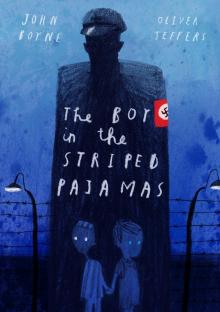 The Boy in the Striped Pajamas
The Boy in the Striped Pajamas Next of Kin
Next of Kin The House of Special Purpose
The House of Special Purpose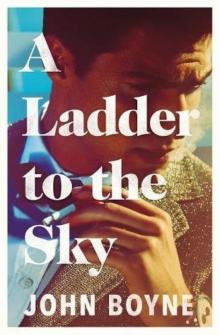 A Ladder to the Sky
A Ladder to the Sky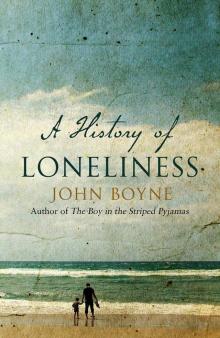 A History of Loneliness
A History of Loneliness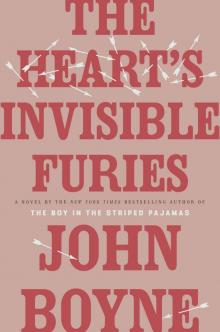 The Heart's Invisible Furies
The Heart's Invisible Furies The Boy at the Top of the Mountain
The Boy at the Top of the Mountain Stay Where You Are and Then Leave
Stay Where You Are and Then Leave Crippen: A Novel of Murder
Crippen: A Novel of Murder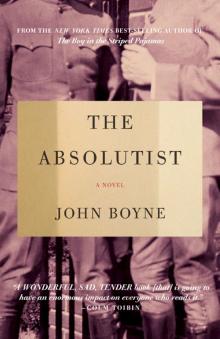 The Absolutist
The Absolutist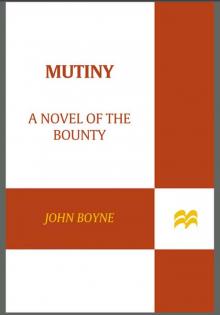 Mutiny: A Novel of the Bounty
Mutiny: A Novel of the Bounty A Traveler at the Gates of Wisdom
A Traveler at the Gates of Wisdom The Congress of Rough Riders
The Congress of Rough Riders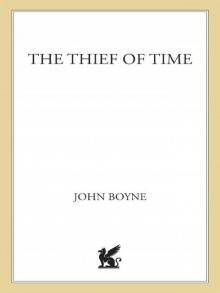 The Thief of Time
The Thief of Time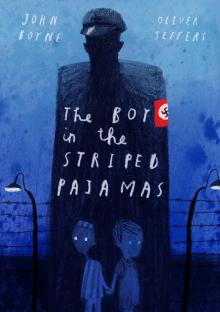 The Boy in the Striped Pajamas (Deluxe Illustrated Edition)
The Boy in the Striped Pajamas (Deluxe Illustrated Edition)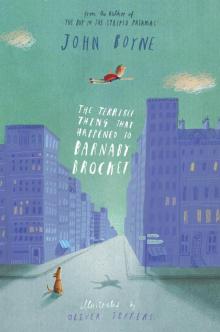 The Terrible Thing That Happened to Barnaby Brocket
The Terrible Thing That Happened to Barnaby Brocket The Boy In The Striped Pyjamas
The Boy In The Striped Pyjamas Crippen
Crippen